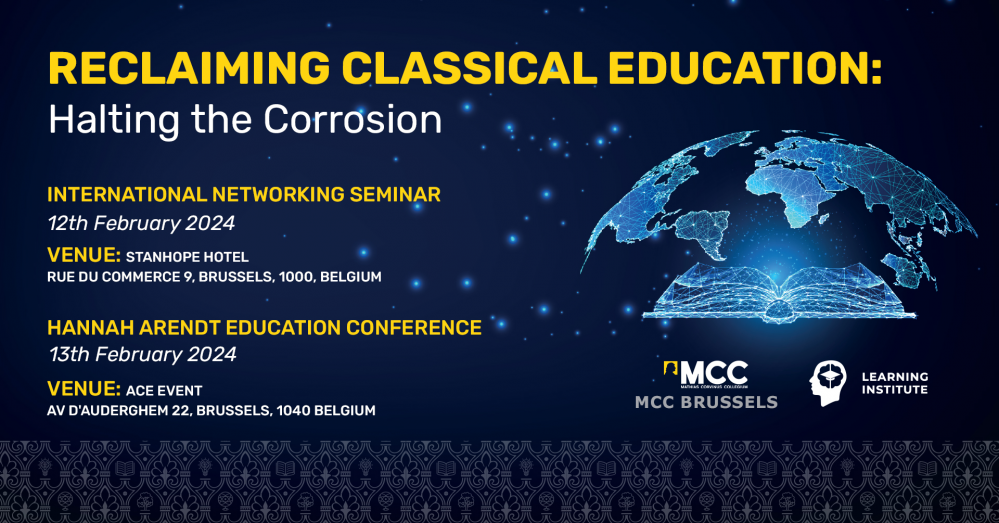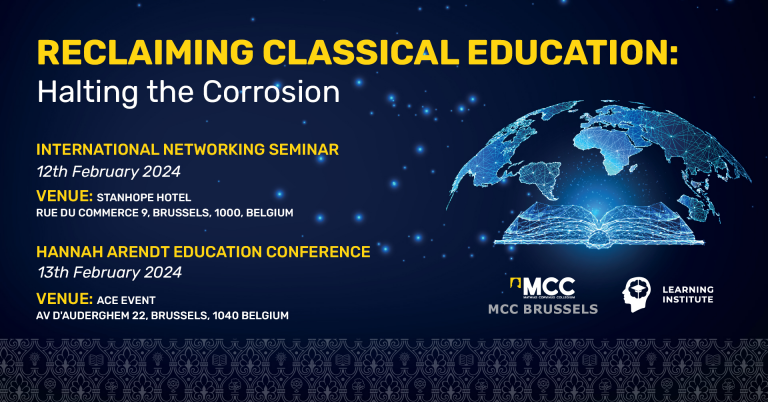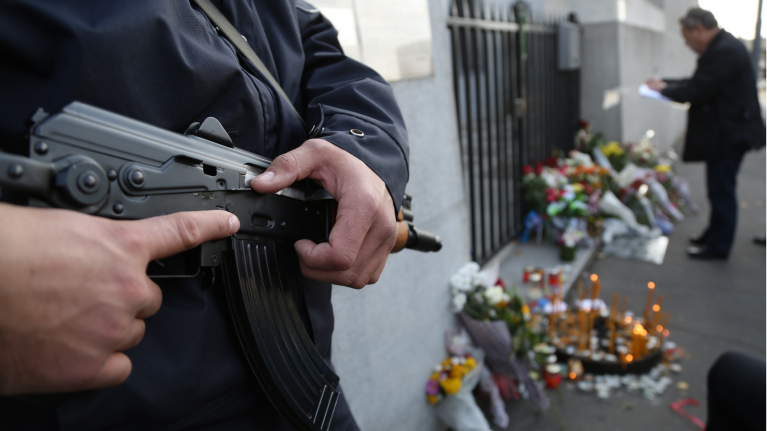About
“Education is the point at which we decide whether we love the world enough to assume responsibility for it, and save it from that ruin which, except for renewal, except for the coming of the new and young, would be inevitable.”
Hannah Arendt
Europe has wasted decades miseducating our young people. We have let down repeated generations with an education which is lacking quality, lacking content, lacking morality, and lacking confidence about the future. The results are sadly clear to see: declining standards, teachers who lack authority in the classroom, pupils who know little of our history and values, and generations beset by mental health crises and fear of the future.
As educational standards have declined and intellectual content has seeped out of the classroom, education has become increasingly colonised by controversial ideological agendas. It seems today that young people are more likely to be able to name 25 genders than 25 past rulers of their country. In the place of an education that celebrates national and European achievements, and transmits the legacy of the past to young people to make their own, education is weighed down by lessons on everything from “emotional intelligence” to “financial literacy” – anything but knowledge.
The classroom is perhaps the most important battleground of the contemporary culture war. Unless Europe can address declining standards, the de-valuing of knowledge, education’s takeover by psychology, and above all the politicisation of the curriculum by hostile ideologies, the potential of generation after generation will be lost.
This conference is a chance to understand the scale of the challenge facing European education and how we can restore the proper role of education: where high intellectual standards, knowledge of Europe’s achievements, genuine excellence and creativity, and the authority of teachers and adults takes centre stage – and where extreme ideologies, from transgenderism to digitalisation, are side-lined.
Register here
Programme outline:
-
09:00: Opening Remarks
-
09:15: Keynote: 70 Years After Hannah Arendt’s ‘The Crisis in Education’.
-
09:45: Panel One: Why are education standards in decline?
-
11:45: Panel Two: Skills and knowledge in tension: What should the curriculum teach?
-
14:15 Panel Three: Confronting therapeutic education
-
16:15: Panel Four: Confronting the politicisation of the curriculum
- 17:30: The obstacles to the transmission of the legacy of the past
Speakers:
-
Jean-Paul Brighelli, teacher; essayist; school reformer
-
Jonathan Butcher, senior research fellow, The Heritage Foundation
-
Tim Crowley, lecturer in philosophy, University College Dublin
-
Professor Frank Furedi, executive director, MCC Brussels
-
Richard Fodor, research group coordinator, MCC Learning Institute
-
Dennis Hayes, professor of education, University of Derby; founder and director, Academics for Academic Freedom (AFAF); author, The Dangerous Rise of Therapeutic Education
-
Penny Lewis, lecturer, University of Dundee; author, Architecture and Collective Life
-
Paige Macpherson, associate director, Education Policy, Fraser Institute
-
Ruth Mieschbuehler, senior lecturer in education, University of Derby
-
Jo-Anne Nadler, author, Too Nice to be a Tory; writer, Civitas UK; school campaigner
-
Anthony O’Hear, philosopher; professor of philosophy, University of Buckingham; advisor to UK Government on teacher training and cirruculum
-
Jacob Reynolds, head of policy, MCC Brussels
-
Alex Standish, associate professor of geography education, UCL
-
Alka Sehgal Cuthbert, author, What should schools teach; director, Don’t Divide Us
-
János Setényi, director, MCC Learning Institute
-
Joanna Williams, founder, Cieo, author, How Woke Won; columnist, Spiked
-
Liliana Śmiech, president, Warsaw Institute
Full agenda:
08:30
Registration
09:00
Opening Remarks
- Professor Frank Furedi
09:15
Keynote: 70 Years After Hannah Arendt’s ‘The Crisis in Education’.
In 1954, the German-Jewish émigré intellectual Hannah Arendt, following the publication of her celebrated study of totalitarianism, published a landmark essay tackling the ‘general crisis’ of the modern world which was most acutely manifesting itself in the sphere of education.
In the essay, Arendt reflects on what are now the familiar, fundamental themes of educational crisis: the decline in standards, the collapsed authority of the teacher, the fixation on the child and, above all, the loss of faith among adults about the legacy of the past that education serves to transmit. She traces a path between reaction and untrammelled liberalism that is, at its core, conservative in the fullest sense of the word. 70 years after the publication of the essay, the challenges faced by Western education systems are only more acute. This lecture will examine how we can learn from the analysis Arendt provided to clarify and confront the problems of the present.
- Jacob Reynolds, head of policy, MCC Brussels
09:45
Panel One: Why are education standards in decline?
The only time European elites pay any attention to the declining standards in schools is when a new ‘international comparison’ is published or when businesses complain new graduates lack the right ‘skills’. But putting aside these often dubious comparisons, little attention is paid to the widespread sense that contemporary education no longer has the rigour and quality it does in the past. Traditional markers of rigour like the teaching of Latin or the mastery of multiple foreign languages, the most complex elements of formal education such as advanced calculus in mathematics or demanding technical mastery in art or design, and the expectation to master wide range of texts in literature classes – all are fast disappearing across Europe. While investment in education may be at historical highs, the quality of education that young people receive seems a pale imitation of the ideals that once underpinned the system.
Why, then, have standards declined? What cultural and social forces have conspired to rob young people of the chance to develop themselves intellectually and receive the intellectual inheritance of the society they were born into? Many have blamed the impact of ‘market forces’ in education. But equally important seem the widespread loss of faith in what education sets out to do or any agreement or perhaps even understanding about what we should teach. Today, few would defend the achievements of the past and the need for young people to master the building blocks of their culture. In such a climate perhaps the very idea of ‘standards’ for education makes little sense.
This session will ask where the impetus to water down education has come from.
- Penny Lewis, lecturer, University of Dundee; author, Architecture and Collective Life
- Jean-Paul Brighelli, teacher, essayist, school reformer
- János Setényi, director, MCC Learning Institute
- Jonathan Butcher, Heritage Foundation
11:15
Coffee break
11:45
Panel Two: Skills and knowledge in tension: What should the curriculum teach?
A long line of European politicians have insisted that education fails to give young people the ‘skills’ they need to succeed in the world. A recurring theme is the argument that knowledge-led curricula quickly become outdated in our ever-changing world and information-rich age, leading to an emphasis on teaching transferable skills. The objective of education has switched from the transmission of knowledge to serving nebulous social objectives. For example, the EU’s European Skills Agenda prioritises ‘strengthening sustainable competitiveness’, ‘ensuring social fairness’ and ‘building resilience to react to crises’.
The contemporary focus on ‘skills’ is a departure from the traditional debate about the balance of vocational and academic subjects. For one thing, the insistence on knowledge being ‘transitory’ and always already ‘out of date’ fails to distinguish between actual knowledge and mere information. Without a bedrock of knowledge, how are young people to sort through and distinguish amid the mass of information we are presented with in the social media age? If ‘what is known to be true changes by the hour’, what is there left to teach? Can serious knowledge help people navigate a world of “fake news” and competing facts?
In addition, the rush to import new ‘skills’ into the curriculum has paradoxically had a negative effect on genuine skills: students seem less capable in languages, less able to think independently, and less able to organise than before the skills obsession. At the heart of the debate is a fundamental question: what should we teach? This session aims to address this foundational question for education.
- Alka Seghal Cuthbert, author ‘What should schools teach’, director, Don’t Divide Us
- Richard Fodor, research group coordinator, MCC Learning Institute
- Ruth Mieschbuehler, senior lecturer in education, University of Derby
- Anthony O’Hear, philosopher; professor of philosophy, University of Buckingham; advisor to UK Government on teacher training and cirruculum
13:15
Lunch
14:15
Panel Three: Confronting therapeutic education
To listen to contemporary educationalists, you would imagine that the main purpose of education is to give young people ‘self-esteem’ or ‘confidence’, to manage bullying or body-image issues, or to support and validate their identities. At the same time, talk abounds of a widespread mental health crisis among young people. Young people seem more overwhelmed, and less able to cope with daily life, than ever before. Paradoxically, it seems as if the increased focus on mental health in education has only served to make young people more anxious. The “coddling of the American mind” has reached Europe.
Classically, education was supposed to provide young people with a sense of ‘character’ – a set of virtues that allowed them to manage the demands of the world. Today, this moral ambition to transform young people seems to have been replaced with a psychological ambition to ‘validate’ their worries and concerns. How did psychology become so dominant in the classroom? Has education been transformed into a programme of therapy? What happens to the ambition to actually teach young people things if they consider themselves to be so damaged by modern life that all they can do is ‘cope’?
- Ashley Frawley, MCC Brussels
- Dennis Hayes, professor of education, University of Derby; founder and director, Academics For Academic Freedom (AFAF); author, The Dangerous Rise of Therapeutic Education
- Alex Standish, Associate Professor of Geography Education, University College London
15:45
Coffee Break
16:15
Panel Four: Confronting the politicisation of the curriculum
It seems that politicians spend more time on attempting to re-engineer education policy than almost anything else. Every social problem, from climate to racism, is the subject of a campaign to address it through the education system. Diversity, equity and inclusion (DEI) seems to feature in almost every classroom subject.
What happens to the education system when politicians seem to turn it into a solution to all social woes? The main result seems to be that education is perhaps more ideological than ever before – reshaping people to hold the right values, opinions and beliefs seems the chief role of education policy today.
How should we respond to the saturation of education policy by political imperatives? Many would be quite happy to simply replace progressive indoctrination with a conservative alternative. But such simplistic reversals seem blind to the real problem: with no authority of its own, the crucial distinction between education and the rest of life is lost. Should we seek to root out the DEI disease from education and replace it with more ‘conservative’ values, or do we need an alternative approach altogether?
This session will aim to address this quandary.
- Joanna Williams, founder, Cieo, author, How Woke Won, Columnist, Spiked
- Liliana Śmiech, President, Warsaw Institute
- Tim Crowley, lecturer in philosophy, University College Dublin
17:30
The obstacles to the transmission of the legacy of the past
- Professor Frank Furedi, executive director, MCC Brussels


